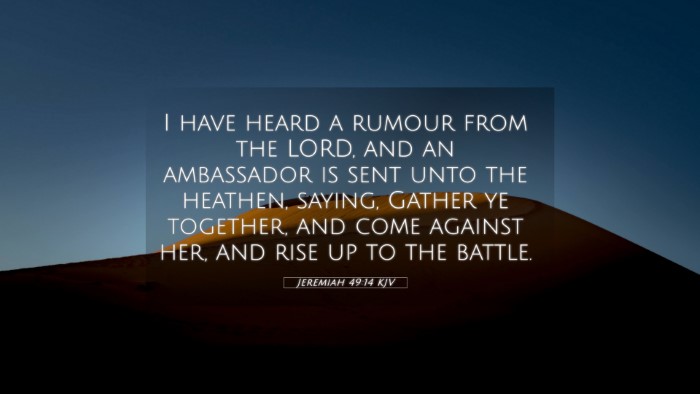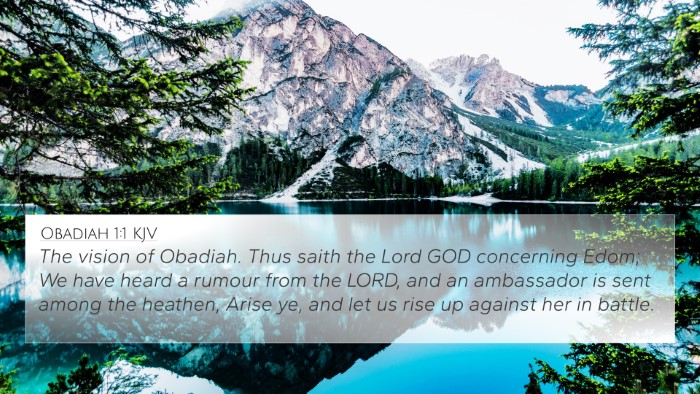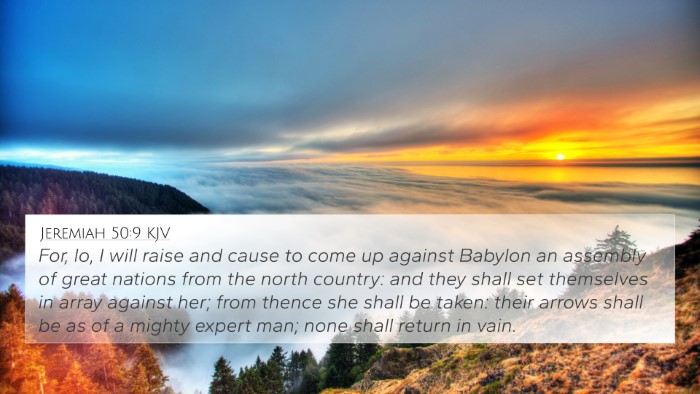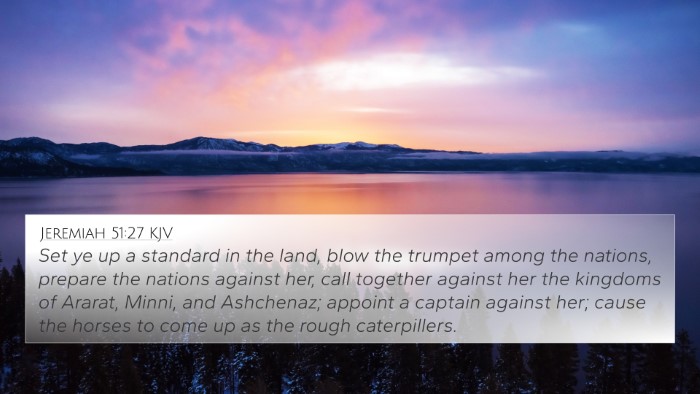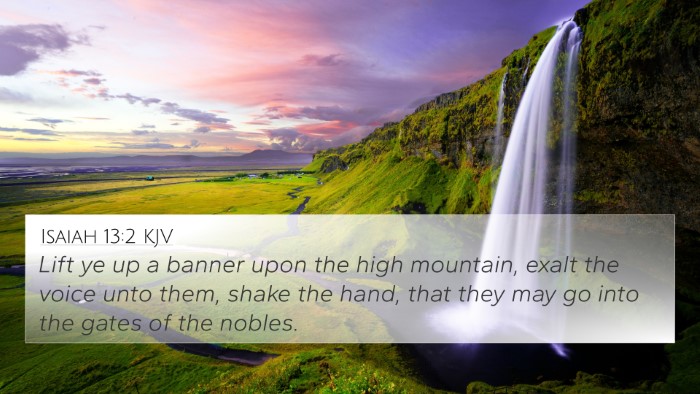Understanding Jeremiah 49:14
Jeremiah 49:14 states:
"I have heard a rumor from the LORD, and an ambassador is sent unto the heathen, saying, Gather ye together, and come against her, and rise up to the battle."
This verse encapsulates a prophetic message concerning the judgment and impending destruction of the nation of Edom. The verse highlights the communication from God to the nations regarding their responsibility to rise up against Edom, which faced divine judgment due to its actions and attitudes toward God's chosen people.
Verse Meaning and Interpretations
Insights from various commentators provide a deeper understanding of the underlying message:
-
Matthew Henry:
Henry interprets this passage as God's warning to Edom and surrounding nations. The "rumor" signifies divine intelligence relayed to those who would take part in the judgment process against Edom. Henry emphasizes the certainty of God's proclamations and the necessity for nations to heed His call for justice.
-
Albert Barnes:
Barnes focuses on the ambassador's role, suggesting that God employs messengers not only to convey warning but to mobilize nations for action. He reflects on the consequences of Edom’s pride and hostility, asserting that such nations will inevitably face retribution.
-
Adam Clarke:
Clarke notes the strategic importance of Edom in the geopolitical landscape and interprets the call to battle as a divine orchestration of events leading to Edom’s downfall. He underlines the nature of God's sovereignty and the active participation of nations in executing His judgment.
Connections with Other Bible Verses
Understanding Jeremiah 49:14 involves exploring its connections with other scriptures that elaborate on similar themes of judgment and divine intervention. Below are several related verses:
- Isaiah 34:5-6: This passage also speaks about God's sword being bathed in heaven, destined for Edom, aligning with the prophetic declarations of judgment.
- Ezekiel 25:12-14: Here, God pronounces judgment against Edom, emphasizing the theme of retribution against nations that wronged Israel.
- Obadiah 1:15: Obadiah stresses the "day of the Lord" upon all nations, highlighting Edom's culpability in the suffering of Israel.
- Amos 1:11-12: This passage outlines God's judgment against Edom for their violence, further expanding on the same prophetic tradition as Jeremiah.
- Malachi 1:3: Malachi speaks of God's hatred towards Edom, indicating the prolonged disfavor that led to the proclamation in Jeremiah.
- Zephaniah 2:8-10: This reinforces the promise of desolation for nations like Edom, illustrating the theme of retributive justice.
- Lamentations 3:34-36: God’s justice is depicted, illustrating His omnipotent authority over nations and individuals alike regarding judgment.
- Romans 12:19: The New Testament revisits the principle of God’s vengeance, assuring believers that justice belongs to Him, which echoes in the Old Testament prophecies.
- Hebrews 10:30: This verse aligns with themes of divine retribution, affirming that the Lord will repay, echoing the sentiments of judgment found in Jeremiah.
Thematic Applications
The implications of Jeremiah 49:14 extend beyond Edom. Here are key themes that can be derived:
- Divine Sovereignty: Both the Old and New Testaments affirm that God rules over nations and uses them for His purposes.
- Judgment and Justice: This verse, through cross-referenced themes, displays the seriousness with which God approaches justice against those who oppose His will.
- Call to Action: Just as nations were called to battle, believers are called to respond actively in faith against sin and injustice.
- Interceding for the Oppressed: The judgment of Edom serves as a reminder that God protects His people, calling for accountability in how nations deal with others.
Conclusion
Jeremiah 49:14 is more than a historical admonition against Edom; it illustrates profound biblical truths about God's authority, the certainty of judgment, and the continual dialogue between God's people and the world. Through understanding this verse alongside its cross-references, believers can glean insights into God’s righteous governance and the ever-relevant principles of justice and mercy.
Tools for Further Study
To dive deeper into biblical analysis, consider utilizing the following tools:
- Bible concordance for locating themes and phrases.
- Bible reference resources to explore cross-references.
- Comprehensive Bible cross-reference materials for contextual studies.
- Cross-reference Bible study for systematic biblical interpretation.
- Methods on how to use Bible cross-references for thematic exploration.

